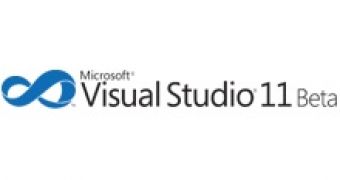Microsoft is gearing up for the release of a new version of its Visual Studio tool, one that will include enhancements to make it fit for the development of applications for all Windows platforms.
The upcoming Visual Studio 11 will also include a new version of Visual Studio Express, which arrives with support for Windows 8, Windows Phone, Windows Azure and for the Web, Microsoft announced.
The tool will offer developers the possibility to easily come up with applications for each of the platforms, courtesy of its included support for multiple languages, specific to them.
“For example, the Express edition for Windows 8 allows developers to use C#, Visual Basic, C++ and JavaScript. It also provides best-in-class tools for creating Metro style apps for Windows 8, including tools such as Blend, app profiling, unit testing and more,” Microsoft explains.
One of the important inclusions in this release is Visual Studio Express for Windows Phone, which will be delivered as soon as the next version of the mobile platform arrives.
Additionally, there will be Windows Azure tooling available when the platform receives the next update. In the meantime, Visual Studio 2010 Express for Windows Phone and Windows Azure SDK for .NET should provide devs with the necessary tools to create applications for these OSes.
“Finally, LightSwitch, which launched last year as an out-of-band release, is now officially part of the Visual Studio 11 core product family. LightSwitch features will be available through Visual Studio 11 Professional, Premium, and Ultimate editions,” Microsoft announced.
Visual Studio 11 arrives with important performance enhancements, yet the tool will come with the same hardware requirements as Visual Studio 2010 did before it. Developers will be able to move to it without having to purchase hardware upgrades for their computers.
“Visual Studio 11 leverages core capabilities that are only present in the latest versions of Windows. For this reason Visual Studio 11 requires Windows 7 or higher to run,” Microsoft states.
Apps built using Visual Studio 11 will target .NET Framework 4.5 and the VC11 toolset, which means that they will work on Windows Vista and higher. Developers will be able to build for Windows XP and Windows Server 2003 as well, via multi-targeting.
Managed developers can design applications to target .NET Framework 4 or the .NET Framework 4 Client Profile, which will make them compatible with the aforementioned platforms.
“Note that when you update your app to target .NET Framework 4, you can continue using the new Async features by installing the Async Targeting Pack for Visual Studio 11,” Microsoft explains.
C++ developers are also able to take advantage of multi-targeting in Visual Studio 11 to continue using the compilers and libraries that came with Visual Studio 2010 to deliver applications for Windows XP and Windows Server 2003.
However, they should keep in mind that multi-targeting for C++ applications requires a side-by-side installation of Visual Studio 2010 at the moment.
“Separately, we are evaluating options for C++ that would enable developers to directly target XP without requiring a side-by-side installation of Visual Studio 2010 and intend to deliver this update post-RTM,” Microsoft concluded.
Visual Studio 11 Beta is currently available for MSDN subscribers. You can download Visual Studio 10 from Softpedia via this link.

 14 DAY TRIAL //
14 DAY TRIAL //